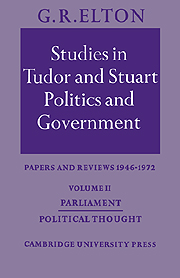Book contents
- Frontmatter
- Contents
- Acknowledgments
- Abbreviations
- III PARLIAMENT
- 21 Studying the History of Parliament
- 22 ‘The Body of the Whole Realm’: Parliament and Representation in Medieval and Tudor England
- 23 Parliamentary Drafts 1529–1540
- 24 The Evolution of a Reformation Statute
- 25 The Commons' Supplication of 1532: Parliamentary Manoeuvres in the Reign of Henry VIII
- 26 An Early Tudor Poor Law
- 27 The Stuart Century
- 28 A High Road to Civil War?
- 29 The Unexplained Revolution
- IV POLITICAL THOUGHT
- General Index
- Index of Authors Cited
21 - Studying the History of Parliament
Published online by Cambridge University Press: 23 December 2009
- Frontmatter
- Contents
- Acknowledgments
- Abbreviations
- III PARLIAMENT
- 21 Studying the History of Parliament
- 22 ‘The Body of the Whole Realm’: Parliament and Representation in Medieval and Tudor England
- 23 Parliamentary Drafts 1529–1540
- 24 The Evolution of a Reformation Statute
- 25 The Commons' Supplication of 1532: Parliamentary Manoeuvres in the Reign of Henry VIII
- 26 An Early Tudor Poor Law
- 27 The Stuart Century
- 28 A High Road to Civil War?
- 29 The Unexplained Revolution
- IV POLITICAL THOUGHT
- General Index
- Index of Authors Cited
Summary
There are, of course, good reasons for the amount of attention which historians have given to the English Parliament. So much has been written about it, one way or another, that the uninitiate might suppose the subject exhausted; and for some time a good deal of the labour available has been directed into other channels. Nevertheless, the magnetic field of parliamentary studies continues to operate, so much so that even historians looking at social structure or economic reform keep returning helplessly to the small number of people who made up that institution. The central position of Parliament in all English history is virtually axiomatic, and like all axioms it ought to be more often questioned than it is; but whatever one may think of that point, so long as historians will devote themselves to Parliament it is desirable that their labours should now and again be put under the lens. Several major and many lesser works have appeared in the last twentyfive years; two major ‘projects’ are in hand; it is not improper to enquire whether all that energy is being put to the best possible uses.
There is no need to do more than mention the achievements of recent years; they are familiar to all concerned. Nearly every century of parliamentary history has had its devotees. Sir Goronwy Edwards and J. S. Roskell have enlarged our knowledge of the late-medieval Commons; a fairly solid orthodoxy has been established which returns the lower House almost to the central position assigned to it by Stubbs but recognizes the influential weight of the Lords as well.
- Type
- Chapter
- Information
- Studies in Tudor and Stuart Politics and GovernmentPapers and Reviews 1946–1972, pp. 3 - 18Publisher: Cambridge University PressPrint publication year: 1974
- 1
- Cited by



